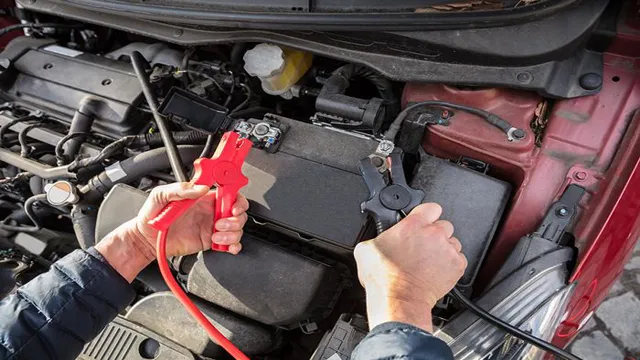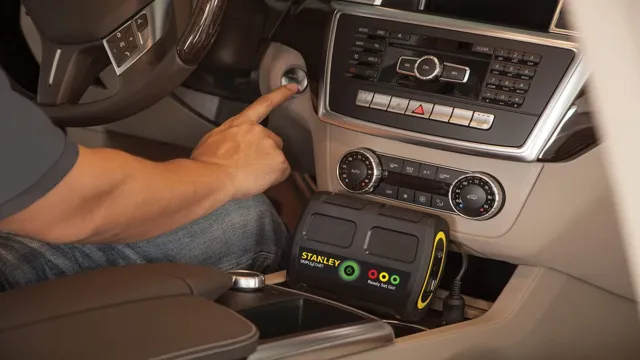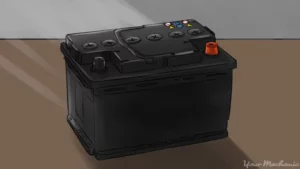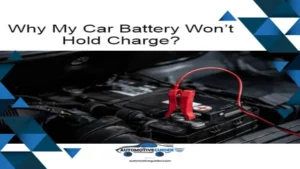Have you ever been in a hurry to start your car, only to find out that your battery is dead? This situation can be frustrating, but luckily car battery chargers exist to save the day. However, if you’re unfamiliar with how they work, you might be wondering: Is it safe to leave a car battery charger overnight? The short answer is yes, it’s generally safe to leave a car battery charger connected overnight. This is because most modern chargers are designed to automatically switch off or reduce their charge rate when the battery reaches full capacity.
This means that it won’t overcharge the battery and cause any damage. That said, there are some caveats to keep in mind. If you’re using an older or cheaper charger that doesn’t have these safety features, there is a risk that it could overcharge the battery and cause it to explode.
Additionally, leaving a charger connected for an extended period of time (weeks or months) could cause damage to the battery itself. In summary, as long as you’re using a modern charger and not leaving it connected for an excessive length of time, leaving a car battery charger overnight is generally safe. However, always make sure to read the instructions for your specific charger and battery to ensure that you’re using it correctly.
Understanding Car Battery Chargers
Many people are unsure whether it is safe to leave a car battery charger on overnight. The short answer is that it depends on the type of charger you are using and the condition of your battery. If you are using a trickle charger or a smart charger, it should be safe to leave it connected overnight.
These types of chargers are designed to continue charging the battery even after it is fully charged, without overcharging it. However, if you are using a standard charger or a fast charger, it is not safe to leave it connected for an extended period of time, as it can overcharge the battery and cause damage. It is important to read the manufacturer’s instructions carefully and monitor the charging process to ensure that your battery is charging safely and efficiently.
Types of Car Battery Chargers
Car Battery Chargers If you’re a car owner, then you should know the importance of having an efficient car battery charger. These handy devices come in different types, each with its own unique features and advantages. Let’s take a closer look at some of the most common types of car battery chargers.
First, there’s the trickle charger, which delivers a low-level charge to keep your battery fully charged over long periods. This type of charger is ideal for vehicles stored for long durations, such as seasonal cars. Next, there’s the float charger, which maintains a battery’s charge at its maximum level without overcharging it.
This type of charger is perfect for use on vehicles that won’t be driven for a while, like boats and RVs. Another type of charger is the smart charger, which automatically adjusts the charging amperage based on the battery’s current state of charge. This type of charger is perfect for those who don’t have a lot of time to charge their car battery, as it can quickly bring the battery back to life.
Finally, there’s the jump starter, which is not technically a charger, but rather a portable power source that can jump-start a dead battery. This type of charger is ideal for those who often experience battery problems while on the road. In conclusion, choosing the right car battery charger is crucial to maintaining your vehicle’s good performance.
By understanding the different types of chargers available, you can choose the one that best fits your needs and avoid any potential battery problems down the road.

How Car Battery Chargers Work
Car battery chargers are essential accessories for every car owner. They play a crucial role in ensuring your battery is always topped up with charge, ready to start your vehicle. Essentially, car battery chargers work by providing a controlled flow of electrical energy to the battery, regenerating the charge and restoring its capacity.
They typically come with two main components – a transformer, which converts the AC electrical input to a DC electrical output, and a rectifier, which converts the DC voltage to the required charging voltage. Different types of battery chargers come with varying charging rates, ranging from slow trickle charging to fast-charging modes designed to restore your battery’s capacity in the shortest time possible. Some models also come with additional features like jump-start capabilities, built-in timers, and automatic shut-off features, among others.
Overall, understanding how car battery chargers work is crucial in maintaining your car’s battery life and minimizing vehicle breakdowns.
Can You Leave the Car Battery Charger On?
Many people wonder, “can I leave a car battery charger on overnight?” The answer is, it depends on the type of charger. Some chargers have an “auto” or “float” mode that will turn off the charging process once the battery is fully charged, preventing overcharging. However, other chargers do not have this feature and can continue to charge the battery, potentially causing damage.
It’s always a good idea to consult the manufacturer’s instructions before leaving a charger connected to a battery for an extended period. Proper usage and charging can prolong the life of your battery, so it’s essential to use caution when charging it. Remember to always monitor your battery’s charge level and disconnect the charger once it is fully charged to avoid any damage to your car battery.
Factors to Consider
Car battery charger If you’re sitting around wondering whether it’s safe to leave your car battery charger on, the answer is – it depends. Leaving a car battery charger on for too long can result in overcharging the battery and causing damage. However, newer, high-tech chargers come equipped with automatic shut-off features that detect when the battery is fully charged and stop charging, preventing overcharging.
It’s also essential to consider the type of battery you are charging as different batteries require different charging strategies. For instance, lead-acid batteries require constant charging while lithium-ion batteries should be charged slowly and delicately to prevent damage. Ultimately, it’s crucial to follow the instructions provided by the manufacturer to safeguard your vehicle’s battery’s longevity and avoid any unpleasant surprises.
Risks Involved
Leaving your car battery charger on for extended periods can be a risky proposition. While it may seem like a good idea to keep the battery topped up and ready to go at all times, there are a number of potential problems that can arise. For one thing, overcharging the battery can cause it to leak, which can lead to corrosion and other damage over time.
In addition, leaving the charger connected for too long can cause the battery to overheat, which can also lead to damage. Finally, constantly charging the battery can shorten its overall lifespan, which means you may need to replace it sooner than you would otherwise. So, while it’s generally safe to leave your car battery charger on for short periods of time, it’s not a good idea to do so for extended periods without monitoring the battery’s condition.
Precautions to Take
If you’re planning to leave your car battery charger on, there are some precautions you should take to avoid any potential hazards. Firstly, ensure that the charger you’re using is specifically made for car batteries and that it has an automatic shut-off feature. This will prevent the battery from overcharging, which can cause damage to the battery and the charger itself.
Secondly, make sure that the charger is securely attached to the battery terminals and that there are no loose connections. Loose connections can result in sparks, which can be dangerous. Lastly, it’s best to monitor the battery periodically while it’s charging to ensure that everything is running smoothly.
If you notice any signs of overheating or other issues, stop the charging process immediately. Overall, leaving the car battery charger on can be a convenient way to keep your car battery charged and ready to go, but it’s essential to take the necessary precautions to ensure safety and prevent damage.
Tips for Overnight Charging
If you’re wondering whether it’s safe to leave a car battery charger on overnight, the answer is generally yes. However, there are some tips to keep in mind to avoid overcharging and damage to the battery. First, make sure to use a charger with an automatic shut-off function to prevent overcharging.
Additionally, check the charge level periodically and unplug the charger once the battery is fully charged to prevent damage from overheating. It’s also important to use a charger that matches the voltage and amperage requirements of your vehicle’s battery. By following these tips, you can safely and effectively charge your car battery overnight.
Just remember to always exercise caution and follow the manufacturer’s instructions to avoid any potential issues or hazards.
How Long to Charge
When it comes to overnight charging, it’s important to consider the charging speed of your device and the type of charger being used. Generally, most smartphones and tablets can reach a full charge in approximately 2-3 hours with a high-speed charger. However, if you’re using a slower charger or your device has a larger battery capacity, it may take closer to 4-6 hours to reach a full charge.
It’s always best to use the charger that came with your device, or a certified third-party charger, to ensure safe and efficient charging. Additionally, consider using a power strip with surge protection to prevent power surges and protect your device from potential damage. Remember, overnight charging is convenient, but it’s important to be mindful of the charging time and safety precautions to ensure your device stays in good condition.
Using Battery Monitor
When it comes to overnight charging, it’s important to use Battery Monitor to ensure the longevity and health of your device’s battery. One simple tip is to charge your device until it reaches around 80% and then stop charging it. This will prevent the battery from becoming overcharged, which can lead to damage and shorter battery life.
Another good practice is to turn off unnecessary apps and features while charging, as this can help reduce the amount of heat generated during charging and prevent damage to the battery. It’s also important to use a reliable charger and avoid cheap and low-quality chargers, as these can cause damage to your device’s battery. By following these simple steps and using Battery Monitor to monitor your device’s battery health, you can ensure that your device’s battery lasts as long as possible and stays in good condition.
Conclusion
In conclusion, leaving a car battery charger on overnight can either be a blessing or a curse. It’s like playing a game of Russian roulette, but with your car’s battery life at stake. The odds may be in your favor, but why take the risk? It’s always better to err on the side of caution and carefully monitor your battery’s charging process.
So, before hitting the hay, unplug your charger and rest easy knowing that your car will start up with ease in the morning.”
FAQs
Is it safe to leave a car battery charger on overnight?
It is generally not recommended to leave a car battery charger on overnight due to the risk of overcharging and damaging the battery.
How long should I leave a car battery charger on?
The length of time a car battery charger should be left on depends on the type of charger and the state of the battery. Generally, chargers should be disconnected once the battery is fully charged.
Can leaving a car battery charger on overnight damage the battery?
Yes, leaving a car battery charger on overnight can potentially overcharge and damage the battery.
What is the best type of car battery charger?
The best type of car battery charger will depend on the specific needs of the user and the type of battery being charged. Some popular types include trickle chargers, smart chargers, and portable jump starters.
How do I know when my car battery is fully charged?
Most modern car battery chargers will have an indicator light or display that will signal when the battery is fully charged. Some chargers may also automatically shut off once the battery reaches full capacity.
What should I do if my car battery is not holding a charge?
If your car battery is not holding a charge, it may be time to replace the battery. However, it is also possible that the issue could be with the charging system or other components of the vehicle.
Can I jump start my car without a battery charger?
Yes, it is possible to jump start a car without a battery charger using jumper cables and a running vehicle. However, it is important to do so safely and follow proper procedures to avoid injury or damage to the vehicles involved.






